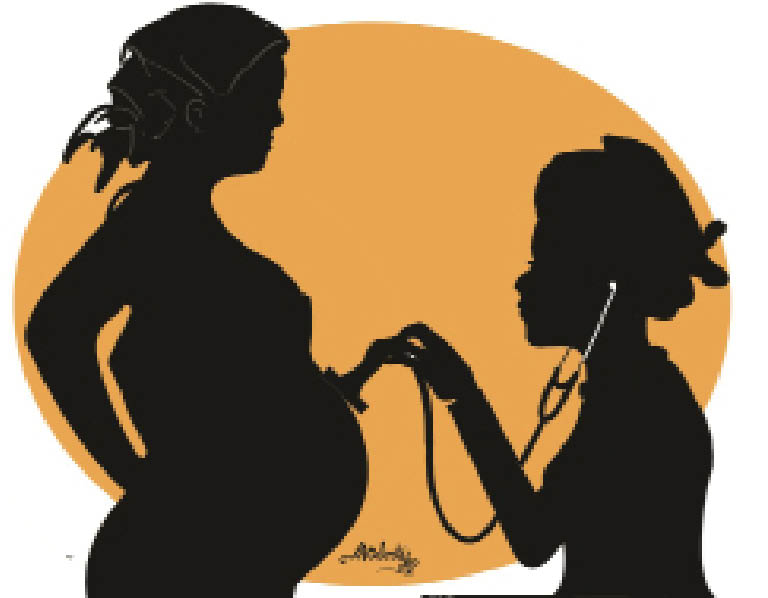How to stay healthy during pregnancy — Expert
It is important for women to do some things and also avoid certain habits and practices in order to stay healthy during pregnancy as experts have said doing so also helps protect the health of the foetus up to birth and thereafter. A Consultant Gynaecologist and Obstetrician, Dr. Victor Ohenhen, said certain peculiarities of pregnancy, […]

It is important for women to do some things and also avoid certain habits and practices in order to stay healthy during pregnancy as experts have said doing so also helps protect the health of the foetus up to birth and thereafter.
A Consultant Gynaecologist and Obstetrician, Dr. Victor Ohenhen, said certain peculiarities of pregnancy, including lifestyle and socio-cultural factors, predisposed pregnant women to illnesses and diseases.
Dr. Ohenhen explained that human pregnancy began from the point of fertilisation of the female gamete (ovum) by the male spermatozoa to form a zygote.
“It is important to stress that pregnancy is not a disease, but a normal process in the female reproductive cycle,” he said.
A mother of four, Mrs. Ifueko Omonigho, said observing health dos and don’ts during her pregnancy made her have “stress and disease-free pregnancies”.
Mrs. Omonigho said it also contributed in ensuring her children were healthy even after birth.
Dr. Ohenhen, who is also the Head of Department of Obstetrics and Gynaecology of the Central Hospital, Benin, Edo State, gave the following tips for staying healthy when pregnant:
Plan every pregnancy: Adequate planning improves outcome for both mother and baby. Also, because every pregnancy takes its toll on the health of the mother, it is important to avoid getting pregnant frequently. It is recommended that women give at least a two-year gap between pregnancies.
Seek care early: Seek ante-natal care early. It is advised that the pregnancy is booked at the second missed period to allow for early identification and treatment of possible problems.
Get plenty of sleep: Getting between seven to nine hours of sleep per day keeps the pregnant woman refreshed and mentally alert. Also, midday naps are an excellent choice during pregnancy.
Reduce stress: Stress wears the body out. It is, therefore, wise to limit activities when pregnant. Get help for certain things beyond your reach whenever possible.
Eat right: Eating the right meals in adequate proportions ensures that you and your baby stay healthy throughout the entire pregnancy period.
Get a support system: This is one aspect of staying healthy that is too frequently ignored. The pregnant woman needs assurance and guidance from her social network. It is not a time to live in isolation but a period to build support systems. This is important for her mental health.
What to eat and do when pregnant
Dr. Ohenhen also advised that women should eat or do the following:
Water: Simple things mean a whole lot during pregnancy. Pregnancy increases your need for water due to a drop in plasma volume that occurs. Water helps to prevent constipation, haemorrhoids and Urinary Tract Infections (UTI). It is recommended that a pregnant woman takes at least eight cups of water daily.
Fruits and vegetables: The importance of fruits cannot be overemphasised. Fruits like avocado are an excellent source of Vitamins C, E and K. They are also rich in fibre. Spinach and orange are rich in folic acid, an important nutrient that helps to prevent neural tube defects during the early phase of pregnancy.
Legumes: Legumes are a superb store of protein, iron, folate and calcium. Examples of legumes are beans, soybeans and groundnuts.
Sweet potato: They are rich in beta carotene that is converted to Vitamin A which is important for a healthy diet.
Eggs: Eggs are the ideal health food because they contain a little bit of almost all nutrients. They are a great addition to your meals during pregnancy.
Lean meat: Moderate amounts of beef, pork and chicken are excellent sources of high quality protein.
Exercise: Reasonable degree of physical activity that suits your tolerability is helpful when pregnant.
The medical expert also advised that women should not eat or do the following when pregnant:
Alcohol: Alcohol consumption during pregnancy is a harmful habit that has well documented effects on the developing child. Examples of these are birth defects and slow growth of the baby referred to in medicine as Intrauterine Growth Restrictions (IUGR). Alcohol consumption, especially when heavy during pregnancy, causes Foetal Alcohol Syndrome (FAS).
Herbs and plants: Pregnancy period is not a time to use herbal products or supplements as this may result in very serious conditions in the baby, especially congenital defects at birth.
Caffeine: Several studies have shown a link between high amounts of caffeine intake and miscarriage.
Junk food and refined sugar: These are not advised during pregnancy due to their effects on the child. It is important to limit the consumption also of carbonated drinks during pregnancy.
Cigarette: Cigarette smoking generates a number of free radicals which immensely affect the health of the baby.
Dr. Ohenhen added that pregnancy period was an exciting time and should be regarded as such.
“With proper health behaviour and adequate diet, a healthy baby and mother is the outcome of the nine-month ‘journey’”, he said.
